Our nature as humans is such that when things are going well, we actually expect them to get worse; what has been anticipated, the logic goes, hurts less. That is why everyone complains sometimes, or would like to complain but thinks better of it; some, however, complain, or would like to complain, more frequently than others. Poles are commonly perceived – or so at least so my lifetime of experience with us and the neighboring nationalities would suggest – as being more prone to complain than the citizens of countries located more to the west. Who complains? First of all, the wronged ones, who complain about the wrong that has been done to them. The Ukrainians complain, and their complaining conveys a real sense of threat. Poland, of course, has been wronged by fate, but rather in terms of geography and climate: it lies in the temperate zone, subject to fluvial and denudation processes, where one weather front follows another, and where April – a warm month in most western countries – somehow always resembles winter more closely than summer, bringing sleet and near-freezing temperatures.1 Such weather can particularly dishearten the elderly and those prone to lumbago, depression, fainting, and suicide. The climate is a handy ersatz, a self-suggesting explanation of our woes. The weather can be blamed for everything, because it won’t answer back, won’t defend itself, the clouds will continue floating across the sky as they have been for billions of years.
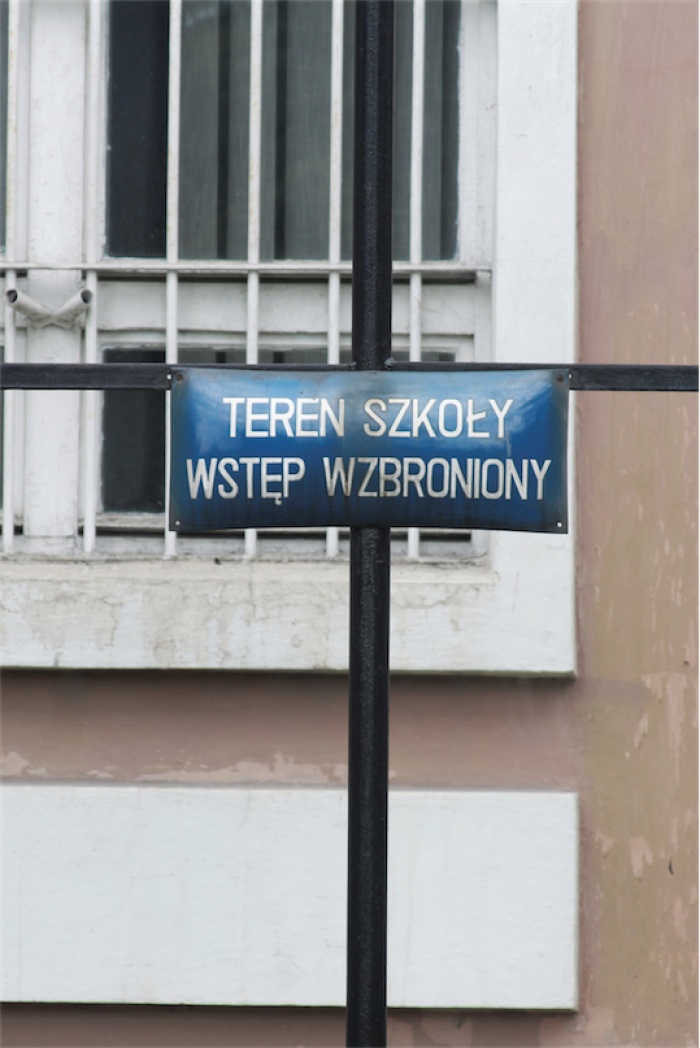
Wilhelm Bielawa, bez tytułu, 2012. Za uprzejmością artysty
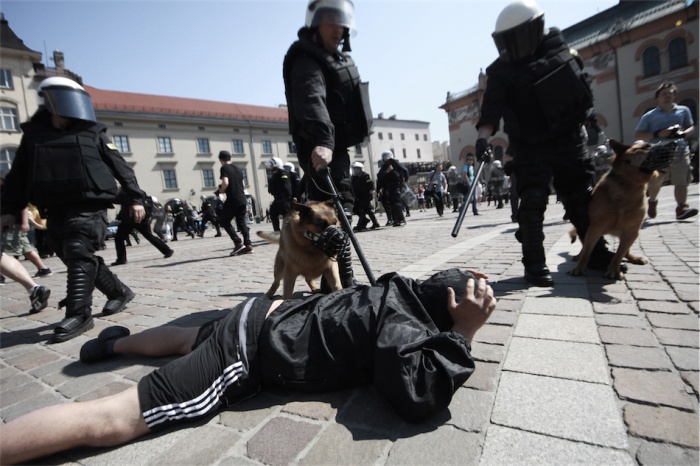
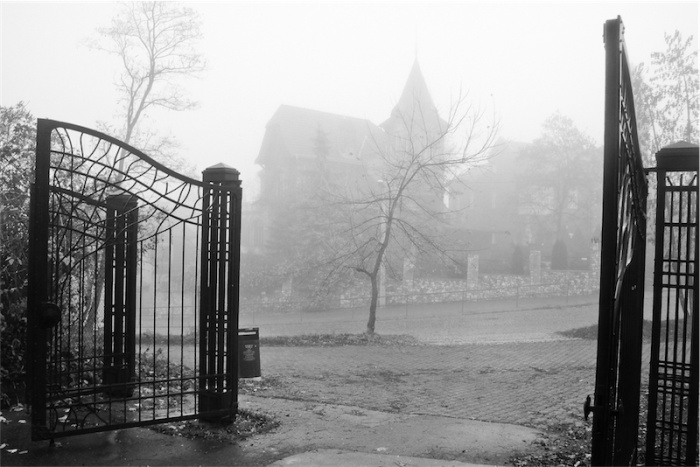
Wilhelm Bielawa, bez tytułu, 2013. Za uprzejmością artysty
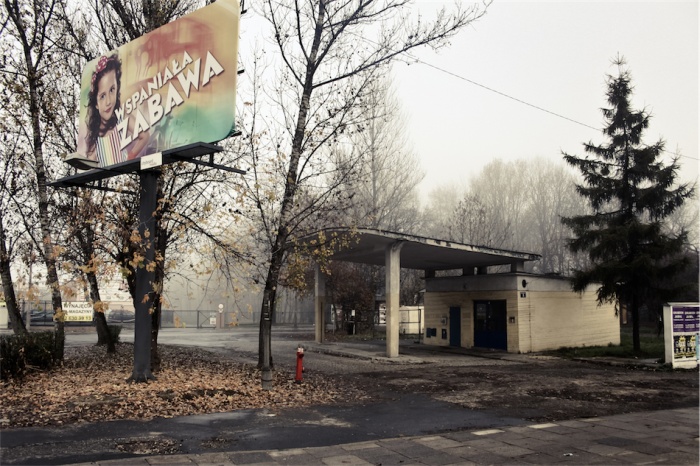
Wilhelm Bielawa, Zona empty city, 2013. Za uprzejmością artysty
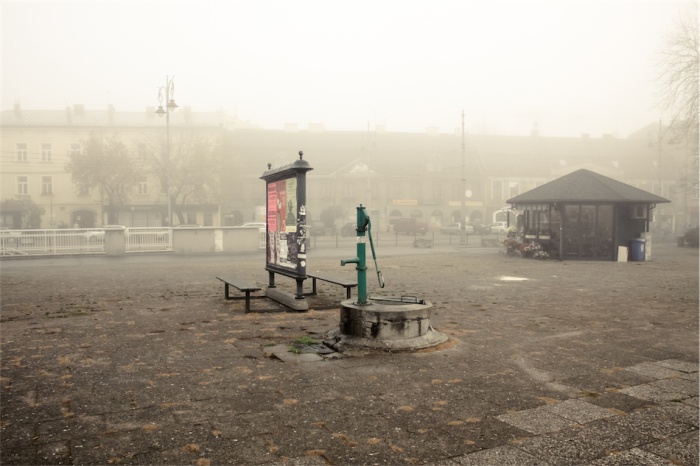
Wilhelm Bielawa, Zona empty city, 2013. Za uprzejmością artysty

Wilhelm Bielawa, Zona empty city, 2013. Za uprzejmością artysty
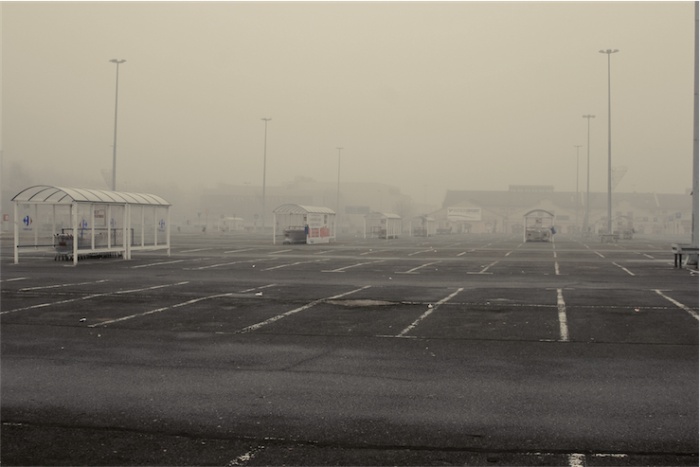
Wilhelm Bielawa, Zona empty city, 2013. Za uprzejmością artysty

Wilhelm Bielawa, bez tytułu, 2014. Za uprzejmością artysty
And if, despite the sleet, we remain upbeat? How to explain that? This usually happens when we are preoccupied with something else, striving towards a self-appointed goal or facing an urgent task that is also welcome or at least exciting. The weather then matters little, or not at all.
Coming second after the weather in the hierarchy of the reasons why Poles complain – though perhaps it actually comes first – is the partitions period, stretching from the late 18th to the early 20th century. One hundred and twenty-three years of political subjugation, when Poles had no national sovereignty, left a mark on the national identity, which consequently transformed into various dispersed figures, molded by the cultures of the partitioning states; they were and still are a good reason for complaining. The Polish language has changed significantly since the First Partition. It is hard to say how much the partitions had contributed to the change, but it is safe to assume that they did make a contribution, and that they added to the fragmentation, diversification, and regionalization of Polish culture rather than its harmonization and universalization.
Another reason to complain has been the lack of gentry roots, which to this day remain a source of prestige. Poles as a people generally suffer from a deficit of prestige. Most of those comprising today’s bourgeoisie, or the middle class, are of peasant stock, and embarrassed by the fact for two reasons: first because their present social status – far more elevated than that of their grandparents – is something they (indirectly) owe to the German/Soviet invasion of Poland in World War II and the resulting decimation of the former elites; and secondly because of their own “peasantry,” their lack of sophisticated manners. Few openly complain about their rusticity. It is usually repressed into the unconscious, and we know that the repressed returns sooner or later, albeit in a different form, for example as grumbling about the weather, about the chronic underdevelopment of Polish design or aviation industry, or about anything that has to do with the State.2 The myth of Sarmatia, according to which every descendant of 19th-century peasantry can master himself, a gentleman with a right of veto in parliament, is a popular mask for covering up the shame of peasant birth. The truth, however, is that our peasant ancestors, who plowed the beautiful Polish fields and rested in the picturesque Polish villages, up to the mid-19th century occupied the lowest rung on the social ladder as serfs of the landed gentry.
The People’s Republic of Poland, in turn, gives a twofold reason for complaint, with some bemoaning its backwardness and others – both groups are large – resenting the present-day democracy, longing for the return of the good old PRL or something in its vein, arguing that before 1989 the system was fairer, if admittedly more authoritarian. It is better, they say, to provide a subsistence minimum to a larger number of people than to create economic conditions that cause income inequality. What matters is the relative peace of mind of the – subjugated, but also paradoxically subjective (at the price of desire) – populace at large. A subject devoid of desire, yoked by the collar of existential subsistence, torn by anxiety and distrust of others. The free market, in turn, staked everything on luxury. First in a coarse, nouveau-riche manner, in the decoration of everything, colorization, gypsy-kitsch architecture. It was also a favorable time for enterprising and resolute individuals. Desire and drive finally prevailed, only this victory meant more social inequality. The common people did not cease being a subject overnight, the common people remember that subsistence-level income was once guaranteed, and long for that sense of security. At the same time, they remain passive and lethargic in the free-market game, in any branch of production. The common people work as cashiers at stores for the affluent bourgeoisie; chains of those stores are owned by talented entrepreneurs or heirs to fortunes.
Impotency, powerlessness, is the cause of complaining. We can’t change the weather, can’t change the world, can’t change anything. This is the usual sequence of the reasons why we complain. Besides climatic-geo-political causes, in which fictional threats smoothly become real, we can also speak of education for complaining, which is something we haven’t inherited in our genes.
Here religion plays a significant role, being closely connected with Polish Romanticism, to which we owe many outstanding works of art, but also a messianic philosophy of waiting passively for someone else (a redeemer) to come and save us from misery.3 From the psychological point of view, the messianic position is one of asking to be intellectually/politically colonized by someone else, who will come and solve our most urgent problems for ourselves. As such, it marks a return to dreams about a salutary dependence on a tender mother. Such messianism leads to the infantilization of society, as it wishes to return to an intellectualized childhood and remain in it.
Long after the Romantic period – which actually never left the “Polish soul” for good4 – Polish messianism manifested itself recently as a fascination with the United States, embracing, with uncritical joy and hope, all things American, oblivious to the fact that the successive presidents of this alleged “paradise on earth” have failed to lift visa requirements for Polish citizens, and regardless of the convincing critique of the American lifestyle and American democracy developed in the 19th century by Alexis de Tocqueville. In the collective imagination of a large portion of Polish society, America has been replaced in its messianic role by the idea of a national community organized around the Catholic religion, so it has been a kind of return to the past, but the problem is that revisiting the past seldom works: the sequels of great movies are usually disappointing. This epigonic shift has been due to globalization and a worldwide downturn in modernizing tendencies. The other portion of the Polish public is neither willing nor able to stage such a return to the past, for it would have to be a return to a former phase of development, meaning a further incapacitation of modernizing forces and a growing involution. But if I am discussing the time of late Polishness and Polish grumbling, I should start with myself lest someone accuses me of seeing specks of sawdust in the eyes of others but failing to notice a plank in my own eye. Indeed, it took me a long time to understand that I am a Pole and to develop a sense of nationality; before that, there was only the word, its sound, and my last name.5 First I was a child and that stage of life, given my psychological capacities at the time, continued for quite a long time. In childhood I learned the Polish national anthem, but it could have been any other anthem. What does it mean? That if it had been some other national anthem I’d would have been learning it too, because I was, first and foremost, a child, that is, subjectively speaking, a world-curious non-religious stateless person, like all kids up to a certain moment. Already then, in fact, I felt that it could have been any other national anthem or hymn sung with devotion, pomp, and earnest feeling at school assemblies, but as soon I shared the observation with adults, I was immediately rebuked and instructed that the anthem was not just a song, but the song of songs. Learning the hymn was thus a meta-learning experience: I was trying to memorize not just an anthem, but the state anthem, the national anthem of Poland. I never fully got the uniqueness of the Polish anthem that grown-ups (teachers) tried to instill in me and in other kids of my generation (born in the late 70s and early 80s) at a primary school in Kraków. The same applied to Catholicism. It was the “papal era,” when for the first time in the history of Christianity a Pole had been elected to the throne in the Vatican, and Catholic religion was taught to kids at a much earlier stage than was the national anthem: in kindergarten. Even before that, Grandmother Izabela taught me the Lord’s Prayer, the foundation and rock on which the Catholic Church rests to this day.

Wilhelm Bielawa, bez tytułu, 2012. Za uprzejmością artysty
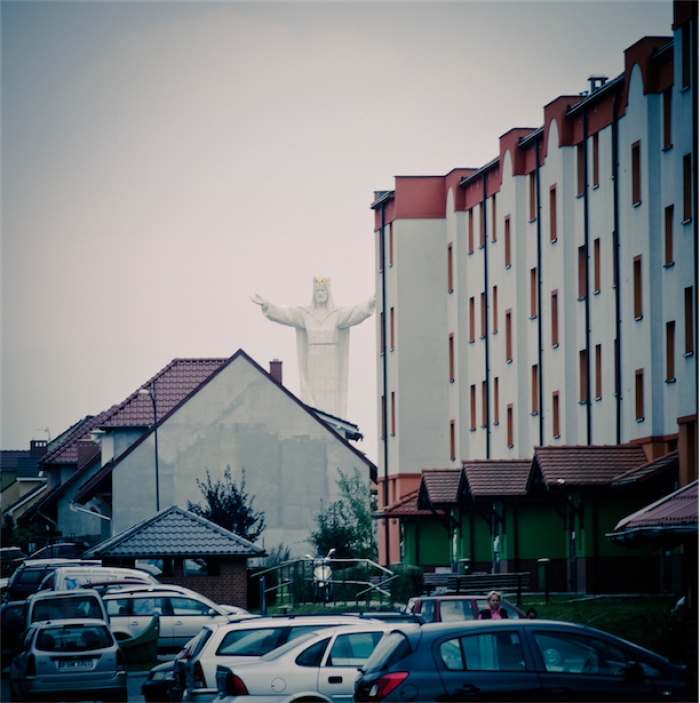
Wilhelm Bielawa, Obsesja, 2013. Za uprzejmością artysty
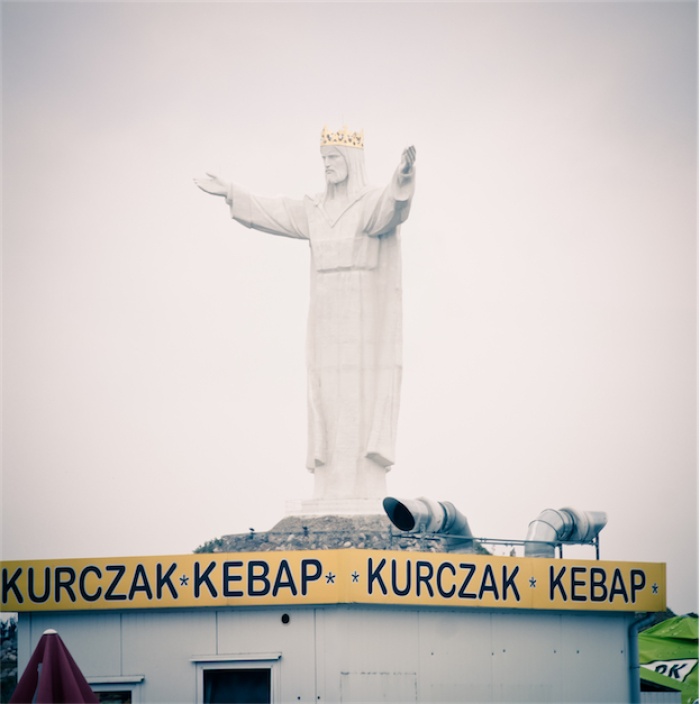
Wilhelm Bielawa, Obsesja, 2013. Za uprzejmością artysty
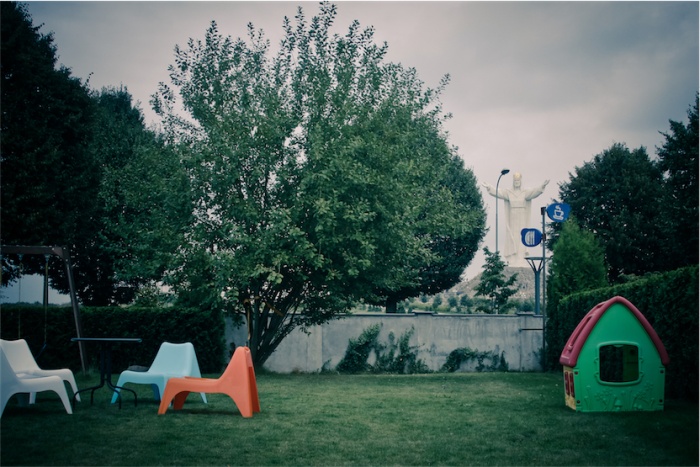
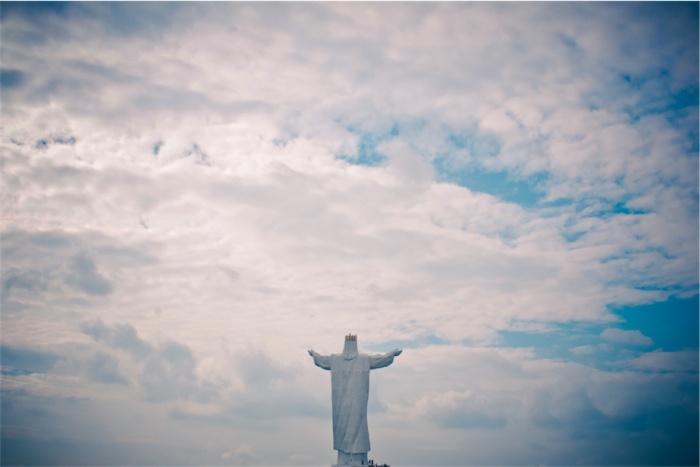
Wilhelm Bielawa, Obsesja, 2013. Za uprzejmością artysty
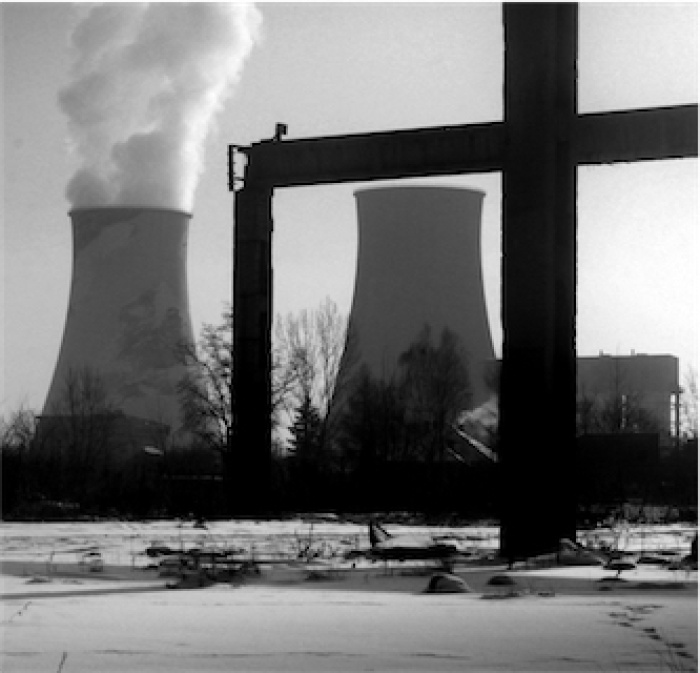
Wilhelm Bielawa, bez tytułu, 2009. Za uprzejmością artysty
Today the question of the Pater Noster looks a bit different than in the 1950s, 1960s, 1970s, and 1980s. These days, it is rather Pokemons, YouTubers, and Minecraft that kids “pray” to in the morning and evening; the Church consequently had to liberalize its standing on children prayers if it wanted to avoid a potentially nasty clash with the high-tech entertainment of late capitalism. Perhaps it did not have to, but at the Second Vatican Council decided to embark on a liberal course, which was recently ironically subverted in Paolo Sorrentino’s The Young Pope TV series. Today we see the Polish Church trying to return to the era before the “erroneous” Vaticanum II, while internationally Catholicism has softened its image, as symbolized by Pope Francis. Even in Poland, the intensification and rationalization of the Church’s hard line has applied to ideology and media image rather than to actual religious practices at home and school. Polish primary-school students pray at the beginning of every religion class, but are not required to say the Lord’s Prayer in the morning and evening or confess their failure to do so. Despite those modernizing gestures, more and more kids have been opting out of religion classes at school, and Church officials frequently complain in interviews about a “decline in vocations.”
It is a fact that all that remains of the former “monastic rule” of Polish childhood is the requirement to attend Sunday Mass. Compared with today’s several-year-olds, my religious instruction resembled the regime of a tertiary order. Like all kids at the time, I said my Pater Noster kneeling in front of a cross hanging on the wall, and I said it this way from the age of three to the age of seven, when I received my First Communion. Before that I had of course been christened, an infant baptism at the age of three months, like most of my fellow citizens. As for the Prayer, I soon found myself lacking the time for the morning one; that saying it (on my knees and aloud) was no longer required of me is another matter. “You’ll pray in your mind, now just hurry up so you’re not late for school,” my mother would say, which was a rational and progressive breach of the norms set by the previous generation. Playing a leading role in the imposition of those norms were consecrated people. I mean here, notably, Sister Daniela Kwas, a nun who taught us Catholicism classes in the run-up to First Communion. Sister Kwas was content with me saying just the evening prayer, which I gradually began to shun too, in fact, especially on Fridays, Saturdays, and on sunny summer days when I roamed around the Polish fields, hamlets, and meadows with my wonderful gang of friends long into the night; on my return home, I would jump into the bathtub, or even straight into bed where I immediately dozed off – no way I was going to kneel down and pray. But Sister Kwas not only taught me new prayers, but also instilled in me a sense of guilt for not saying the evening Our Father. I saw nothing wrong in not saying it, but Sister Kwas told me repeatedly during the Catholic religion classes that not saying the Lord’s Prayer was evil, and that one should not approach for communion and “receive Jesus in his heart” without saying it, and that if one did – having failed to say the Prayer due to neglect or omission, resulting from one’s own unwillingness or laziness, that is, physical and spiritual sloth – one committed the sin of sacrilege, that is, a heavy one, for one had thus cheated Jesus. Adam and Eve tried even to cheat God Himself, and we all know what that led to – the Fall and expulsion. And we don’t want to fall, don’t want to be expelled, condemned. Sister Kwas told me more or less the same things about the Prayer as my grandmother had earlier told me, but she did so in a more zealous and uncompromising way. Somehow the idea of cheating Jesus, God, and the Holy Spirit, who knew about it all anyway (for why wouldn’t they?) – so they could not really be cheated – felt fishy from the beginning. The thought that it was impossible to cheat an omniscient being nagged me for a long time, but I didn’t tell Sister Kwas about it, because I didn’t want to unnerve her further. She was highly stressed anyway.
Like most of my schoolmates, a sense of guilt and sacrilege was something that I learned by heart much better than the uniqueness of the state anthem. Every time during Holy Mass when the great “test” came and those with pure hearts approached the altar stairs to receive Jesus Christ into their pure hearts, while those with impure hearts stood still, with gloomy, tormented faces, pretending to be not there, I felt either a sense of satisfaction with the purity of my heart (if I happened to be all groomed and neat inside after a general confession) or a sense of guilt (if for whatever reason I hadn’t been to confession). My most frequent reason for not going to confession was that I simply disliked the rather unpleasant act. But Sister Daniela Kwas, who was as zealous a catechist as she was an insightful psychologist, explained to me very clearly during religion classes that I didn’t go to confession because I wanted to avoid admitting my own sins to the confessor. Failing to go to confession, postponing the admission of the regularly committed sins of not saying the evening prayer or not attending Sunday Mass, or, later, the (highly pleasant) sin of masturbation, involved an intensification of my sense of guilt. During adolescence, I committed such sins with great zeal, exchanging the tertiary order of childhood for the order of Saint Onan. The sense of guilt grew more and more acute, until going to church became a particularly heavy emotional burden.
I discovered rather late that it was possible not to go to church, and it was the best therapy for my religious dilemmas. At first, not going to church – entering basilicas and cathedrals solely for aesthetic purposes – involved a sense of unease and guilt, but after some time, as a twenty-something, having read Camus and, especially, Nietzsche, I realized that the whole complex mechanism of teaching me to feel guilty, the whole system of self-surveillance that Sister Kwas had taught me, was ultimately bad for me. Moreover, I once again discovered what I had long suspected: that the system was unnecessary, that it was an invention of a group of people who used it to maintain their own well-being and their authority over the “people of God,” that is, the masses of their money-donating supporters. At the same time, I discovered that to leave the system I just needed to stop participating in its rituals and rites, and that it was actually very simple. All that I needed to do was exit a cultural game I had been taught to play since childhood. That exit allowed me to breathe more freely. Alas, I also had to cease doing things that my grandmother (that was the most difficult part) and my parents would have expected of me, although my parents luckily didn’t expect me to show religious devotion, merely to not interfere in religious observances. They themselves have performed those (in an increasingly casual manner) to avoid disappointing their parents’ and grandparents’ expectations, which didn’t become their own, but still panged at their conscience. Though not directly, not by itself, as it would be judged only thirty years ago, leaving the Catholic community still very often means violating the integrity of the cultural and familial community. It is also a community of complainers.
Being part of a community means laughing together (a shared sense of humor), but also complaining together (a similar attitude to negativity). This change has been due to transformations of the social tissue, to an isolationistic and independent model of living beyond religious coordinates that has been increasingly embraced by young people, but also to a wave of divorces affecting today’s 30- and 40-year-olds that has left post-religious castaways stranded on the shore of the real, with its principle of capital accumulation, emancipatory unrestraint, and normalized, guilt-free access to pornography.
Catholic indoctrination trains Poles from early childhood, through a religious family environment and organized peer groups (the Light-Life movement, altar serving, Catholic scouting), to feel an ideologized sense of guilt that is the basis of Church authority and the cornerstone of Polish complaining.
Mea culpa, mea culpa, mea máxima culpa. Here is a symptomatic fragment of a collective prayer said publicly in churches all over the country. And it is really enough, the rest is but a façade. If people regularly repeat these words in silence and concentration, the matter is almost settled. Satisfaction in life disappears, because the exoneration from guilt can never be complete and final but always partial and temporary; however neat and groomed I felt inside after confession and communion, when the Mass ended I always felt relieved that I was now able to play and get dirty again.
The above-quoted mantra, recited time and again with a characteristic weepy intonation, affects the reciters also outside the liturgical context, hammering in a sense of bitterness, guilt, and helplessness, because the sins responsible for the guilt can be effaced by God only. This is accompanied by a sense of moral superiority over all those who don’t repeat the mantra and don’t share the Catholic narrative. Guilt, as well as shame and the Polish martyrology, is the binding agent of a highly exclusive community. Whoever doesn’t share our sense of guilt, shame, and martyrdom is necessarily not with us but against us. He who doesn’t feel guilty is unwittingly guilty, and from the Catholic point of view his unwittingness is also culpable. Lack of faith is, after all, a deficit, a flaw that perhaps even brings into question the possibility of redemption.
I have greatly sinned, in my thoughts and in my words, in what I have done and in what I have failed to do. This is the second part of the Catholic cornerstone of Polish complaining and self-tormenting. Let us think…. to sin in thoughts, how is that done? Isn’t it so that all kinds of thoughts can (and do) occur to us, more or less unchaste and lewd, over which we have no control, which we “didn’t order,” and yet they occur, all kinds of them, depending on the season, mood, hormone profile, amount of sleep, type of chemical substances ingested and so on. Lecherous thoughts are inevitable, because we are sexual beings. Consequently, full exoneration in the Catholic sense is unattainable. As Michel Onfray says, remembering his traumatic stay at a Salesian orphanage, “What I’d seen there – the inability of many of the priests to observe Christian ethics – made me conclude that the ideals of this religion weren’t made for people and could not be fulfilled.”6
In Polish society, a martyrological and culpabilistic exhibitionism reigns, combined with its opposite: arrogance and haughtiness. Impeded with self-blame, creative energy has to find an outlet somewhere and it does, at the opposite end. And isn’t all of this obviously irrational? Well, we aren’t Frenchmen or Germans to give much thought to rationality, are we?
Blame is a negativity that we attribute to ourselves. If we feel guilty, it means that we lack something, have failed to achieve something, couldn’t or wouldn’t do something, or didn’t have enough courage and determination, that we showed a shortage of something. That is why we feel bad, feel that we ourselves are to blame. The Catholic Church feeds on this self-negation, drawing its vital forces and support from it, because guild-laden believers often bequest everything to them in order to secure posthumous redemption, or at least make it psychologically plausible. But it we look from a broader perspective, the increase in probability occurs only in the religious conceptual system, for outside it there is no probability whatsoever about what happens after death; there is only a potential infinity of the possible transformations.
The Catholic indoctrination that most of us were subjected to from our earliest years seems to be the deepest foundation of the pathological complaining that many of our fellow citizens indulge in. The native homo religiosus7 appropriates our personal tragedies (last rites, funerals) for the purposes of institutional religion, usurping existential disasters that we have to cope with on our own anyway, reinterpreting and inscribing them in the Catholic conceptual system and lending them meaning in a Catholic economy. What to think of such processes of instilling guilt and shame in people?
First of all, let us notice that guilt and shame are closely intertwined. We are supposed to be ashamed of our sins, the trespasses we are guilty of. Guilt is thus a reason for shame. Guilt alone is not enough; we should also be ashamed of it. And our Catholics are ashamed of their guilt. Their sour faces are a psychomimic manifestation of a shame felt because of guilt that is serviced, imposed, defined, localized, and preserved by the Catholic Church, which also holds a monopoly for absolving from it. Similar to the sour face that we all know, another manifestation of shame is the typically Polish custom of not looking people in the eye when raising a toast and a general tendency to avoid smiling and eye contact in a conversation. This lowering of the gaze is only seemingly humble. It is motivated by a sense shame caused by an allegedly most grievous fault that has usually accompanied us since birth. The avoidance of eye contact can also (and usually does) signal an aversion to and hatred of others. As a result, it isn’t very difficult in Catholic countries to incite people against each other. People who are filled with a sense of guilt and shame find it hard to be kind and solidary, being too preoccupied with their own misery and misfortune. This moral hypochondria is combined with egocentrism. The hypochondriac-egocentric personality mix makes communication difficult and prevents the emergence of a supportive and long-lasting community.
Enlightenment, Immanuel Kant wrote, is “man’s emergence from his self-imposed nonage.”8 But a true Enlightenment never happened in Poland; it was at best its poorer, clericalized version, a “Catholic enlightenment.”9 In intellectual terms, the Polish Enlightenment was but a shallow modification of medieval ideas. Many of the leading thinkers of the era – such as Archbishop Ignacy Krasicki, Bishop Adam Naruszewicz, or Hugo Kołłątaj and Stanisław Konarski, both clerics – were churchmen, that, is people intellectually and existentially subject to the authority of a confessional state. We didn’t have a Polish Voltaire or Diderot. Ignacy Krasicki, the author of Monachomachia (War of the Monks), was also the Primate of Poland, which can be accepted at face value – Krasicki was after all a critic of monastic debauchery – only in the conditions of peculiar naivety that consents to poor-enlightenment standards of intellectual progress. Returning to Kant, let us notice that the Catholic practice of blaming oneself with the “most grievous fault” is culpable in itself. The latter guilt ceases however when one gets rid of the former.
Our Polish reasons for complaining are very often located in the past, but there is also a progressive, grumbling aimed at the future that assumes the shape of catastrophic predictions, whether the catastrophe is going to be climatic, ecological, political, or personal. Complaining about the future, the Polish catastrophists support Polish messianism, which also leans towards the future and, like catastrophism, is bound up with a sense of powerlessness, impotency, and passive expectation. The powerless complain or keep their mouths shut. Only the former can be heard.
Recently this futuristic model of complaining has incorporated new themes. Every Pole knows about the menacing prospects of immigration from Muslim countries or a war with Russia, just as he knows, or can easily learn from the Web, that glaciers are melting at an unprecedented pace and the global concentration of carbon dioxide is reaching lethal levels. So whereas martyrological complaining, drawing its vital poison (pharmakon) from the past, is linked first and foremost to grievance and guilt, and present-time grumbling usually addresses the weather, blood-pressure spikes, and back pains, future-oriented kvetching is driven by fear.
We don’t know what awaits us tomorrow, next week, or next year, what kind of weather, what kind of political situation (this is a relatively new fear), whether we’ll be healthy, and what kind of difficulties we’ll have to negotiate. Complaining may thus serve to cicurate a dangerous and vague future. It then becomes a form of enchanting, a means of gaining illusory psychological control over events. For if tomorrow things go well, then very well, but if they go bad, if some larger or smaller disaster occurs, we’ll at least be able to say that we predicted it. We thus gain illusory control over reality, which makes us feel better and may help to mitigate post-traumatic shock. Such is the alleged benefit of complaining that the bitching catastrophists unconsciously expect.
For several years now we’ve been living in an era of technological surfeit and increased social mobility. The rapid flow of information, the growing role of friendships,10 and a loosening of the metaphysics of “familial sanctity”– which functioned in Poland for centuries as a standard of being together, deviations from it deemed a grave sin, a profound guilt – have led to a decline in the traditional Polish method of using the Prayer to control the thoughts, words, and deeds of children and youth. People who, like me, were once subjected to its regime are left to go back to the beginnings and re-examine their own inhibitions, their sense of shame and guilt, and it may well turn out that much of that had been instilled in them during many years of Catholic indoctrination conducted by unaware family members under the supervision of Vatican functionaries who continue to gain ever new footholds for expansion in Poland.
Dominating in Polish culture for ten centuries now, Catholicism is the main reason why Poles suffer from moral hypochondria, blame themselves unnecessarily, and expect nothing good in the future. If it’s a warm day today, they are convinced tomorrow will be either too hot or too cold, and if it’s already too hot or too cold, they expect it to continue forever because they deserve it. They examine their weaknesses, of which they are ashamed, which doesn’t prevent them from doing nasty things in real life, because they are people, like everybody else, and people are egocentric creatures, capable of incidental altruism only. The Church ideology feeds on our failings (which won’t ever disappear), building its politics of influence on their basis. Whenever we look, it’s always guilt, sin, shame, condemnation, insufficient repentance, and uncertain salvation, and Jesus Christ is our only hope. This is how reality looks through the Catholic glasses. So how not to complain? In order to emerge from nonage, we must first return to it and subject it to a thorough revision and rethinking, to see the glasses for what they are and realize that we can take them off, because we have no defect of sight and don’t need our vision corrected – rather than pretending that we are grown up and always right, for that right may not be ours at all but something that has been instilled in us in a premeditated and organized manner by various ideologues at a time when we were particularly open to the world, susceptible to influence, intellectually defenseless, and unable to formulate complex arguments without changing the subject, like children are.
Marcin Polak
Translated from the Polish by Marcin Wawrzyńczak
BIO
Marcin Polak (b. 1979) is a philosopher, cultural researcher, chief editor of Nowa Orgia Myśli, National Science Centre grant recipient. Author of the study «Urojone-nic». Postmodernistyczna metafizyka Stanislasa Bretona (Kraków: Wydawnictwo A, 2014). This year Universitas published his latest book, Trauma bezkresu | Nietzsche, Lacan, Bernhard i inni. He has published philosophical and art-critical essays in Miesięcznik Znak, Kwartalnik Filozoficzny, Obieg, Magazyn Szum, Fragile, and other periodicals. He lives in Kraków.
1 Regarding the specifically Polish aura, cf. Maksymilian Wolski, Refleksje z klimatologii subiektywnej, http://nowaorgiamysli.pl/index.php/2017/03/02/refleksje-z-klimatologii-subiektywnej (access: 27 May 2017).
2 Andrzej Leder discusses the peasant roots of the Polish bourgeoisie in an interview with Ewa Wilk, Inna duma, http://www.polityka.pl/tygodnikpolityka/spoleczenstwo/1701072,1,prof-leder-o-dawnej-mentalnosci-polakow.read (access: 15 April 2017); cf. also idem, Prześniona rewolucja (Warszawa: Wydawnictwo Krytyki Politycznej, 2014).
3 Cf. Maria Janion, Mesjanizm to przekleństwo. List Marii Janion do Kongresu Kultury, http://wyborcza.pl/7,75410,20813344,mesjanizm-to-przeklenstwo-list-marii-janion-do-kongresu-kultury.html (access: 11 October 2016).
4 Piotr Augustyniak, Homo polacus. Eseje o polskiej duszy (Kraków: Wydawnictwo Znak, 2016).
5 I wrote about the surname “Polak” in the essay Uśmiechnięci rodacy, http://nowaorgiamysli.pl/index.php/2016/08/18/usmiechnieci-polacy (access: 18 August 2016).
6 In Michel Onfray’s conversation with Maciej Nowicki, “Europa na sprzedaż,” Newsweek, no. 16, 2017, p. 80–82.
7 Many critics of Christianity (such as Krzysztof Pieczyński in Poland) emphasize the fact that it has yoked our native paganism for ten centuries now.
8 Immanuel Kant, Answering the Question: What Is Enlightenment? [Beantwortung der Frage: Was ist Aufklärung?, 1784], trans. Mary C. Smith.
9 https://en.wikipedia.org/wiki/Catholic_Enlightenment (access: 27 May 2017).
10 Wojciech Tymiński’s conversation with Zuzanna Skalska, “Nowy luksus – cisza i ciemność,” Wysokie Obcasy Extra, no. 4 (59), April 2017, p. 92.



